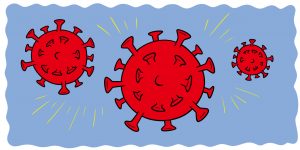Following the highest increase of Georgetown community COVID-19 cases to date, the university announced a series of new protocols on Dec. 15, including banning food and drinks inside communal spaces and closing fitness centers, according to an email from Chief Public Health Officer Dr. Ranit Mishori.
34 students tested positive on Tuesday alone, bringing the positivity rate to 2.36 percent so far this week, according to the email. Residential students who test positive will be required to complete the 10-day quarantine at the hotel through the beginning of winter break unless they have a place to isolate off-campus or at home, provided they can arrive there safely. All other students are expected to leave residence halls by 10 a.m. on Dec. 18 per the original term break schedule.
Students already approved for winter break housing will be housed as planned, according to a follow-up email from Provost Groves. Students looking for winter break accommodations should contact Residential Living.
The outbreak also comes amid final exams on campus, and the university has given faculty latitude to administer exams in accordance with public health guidelines. “If there is no disruption to student preparation, faculty can move from in-person exam formats to virtual or take-home exams,” a university spokesperson wrote in an email to the Voice. Faculty may also request larger classrooms in keeping with physical distancing policies.
An earlier email from Mishori on Dec. 13 also notified the community of the first case of the new Omicron variant at Georgetown in an individual who had not visited campus since before Thanksgiving.
The increase in COVID-19 cases on campus follows similar trends in the District. COVID-19 cases in D.C. have increased by 194 percent in the last 14 days, even as 82 percent of residents are partially or fully vaccinated. Four cases of the Omicron variant were confirmed by D.C. Health on Dec. 12.
With campus closing at the end of the week, the university has closed Leo O’Donovan dining hall to in-person dining for the remaining 72 hours until winter break. All meals at campus dining locations are currently grab-and-go, and the email encouraged students to eat in their residence halls. Eating and drinking in communal spaces, such as the library, is prohibited.
The university also announced the shutdown of Yates Field House and the Scott K. Ginsburg Sport & Fitness Center on Dec. 16.
The news also affected staff working on campus; the College dean’s office urged all departments and programs to allow their staff to telework through the end of the year. Graduate students and staff in the government department were authorized to work from home, according to an email from department chair Prof. Anthony Clark Arend.
All indoor university-sponsored events will be moved outdoors or online, or canceled. The university is also enforcing six feet of physical distancing between individuals in study spaces on campus.
At other universities, the spike in COVID-19 cases has been met with a variety of responses. Cornell University closed its campus to students, moving finals online and permitting students to leave campus if they have finished their exams and tested negative within the last 48 hours. Georgetown University, Boston College, and several other colleges have mandated students receive a booster shot before Jan. 21.
The university has not finalized plans or guidelines for the spring semester and will continue to monitor public health conditions.
Sarah Watson and Annabella Hoge contributed reporting.






